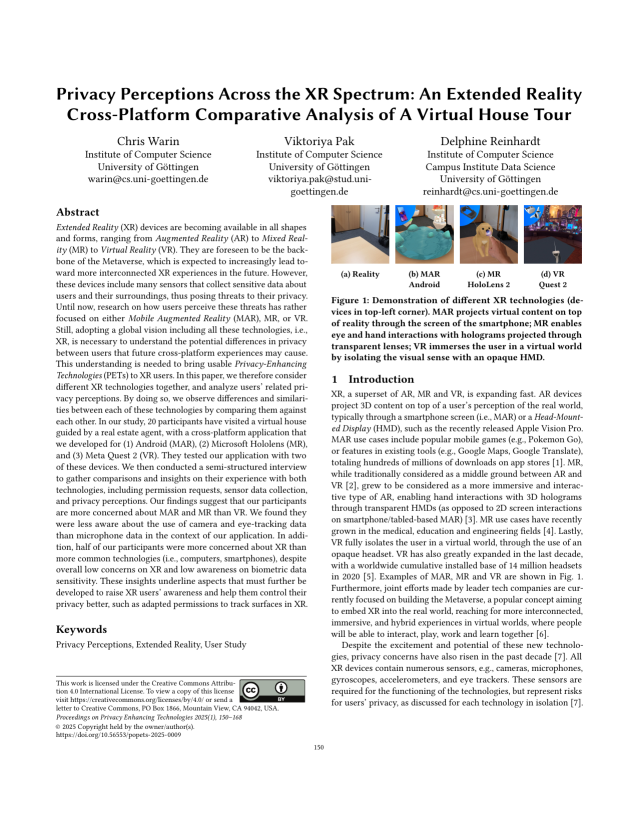Privacy Perceptions Across the XR Spectrum: An Extended Reality Cross-Platform Comparative Analysis of A Virtual House Tour
Authors: Chris Warin (University of Göttingen), Viktoriya Pak (University of Göttingen), Delphine Reinhardt (University of Göttingen)
Volume: 2025
Issue: 1
Pages: 150–168
DOI: https://doi.org/10.56553/popets-2025-0009
Abstract: Extended Reality (XR) devices are becoming available in all shapes and forms. They are foreseen to be the backbone of the Metaverse, which is expected to increasingly lead toward more interconnected XR experiences in the future. However, these devices include a large number of sensors that collect sensitive data about users and their surroundings, thus posing threats to their privacy. Until now, research on how users perceive these threats has rather focused on either Mobile Augmented Reality (MAR), Mixed Reality (MR), or Virtual Reality (VR). Still, adopting a global vision including all these technologies, i.e., XR, is necessary to understand the potential differences in privacy between users that future cross-platform experiences may cause. This understanding is needed to bring usable Privacy-Enhancing Technologies (PETs) to XR users. In this paper, we therefore consider different XR technologies together, and analyze users’ related privacy perceptions. By doing so, we observe differences and similarities between each of these technologies by comparing them against each other. In our study, 20 participants have visited a virtual house guided by a real-estate agent, with a cross-platform application that we developed for (1) Android (MAR), (2) Microsoft Hololens (MR), and (3) Meta Quest 2 (VR). They tested our application with two of these devices. We then conducted a semi-structured interview to gather comparisons and insights on their experience with both technologies, including permission requests, sensor data collection, and privacy perceptions. Our findings suggest that our participants are more concerned about MAR and MR than VR . We found they were less aware about the use of camera and eye tracking data than microphone data in the context of our application. In addition, half of our participants were more concerned about XR than more common technologies (i.e.,computers, smartphones), despite overall low concerns on XR and low awareness on biometric data sensitivity. These insights underline aspects that must further be developed to raise XR users’ awareness and help them in better controlling their privacy, such as more adapted sets of permissions to track surfaces in XR.
Keywords: Privacy Perceptions, Extended Reality, User Study
Copyright in PoPETs articles are held by their authors. This article is published under a Creative Commons Attribution 4.0 license.

